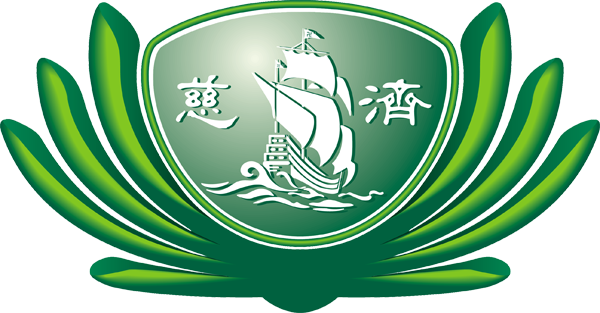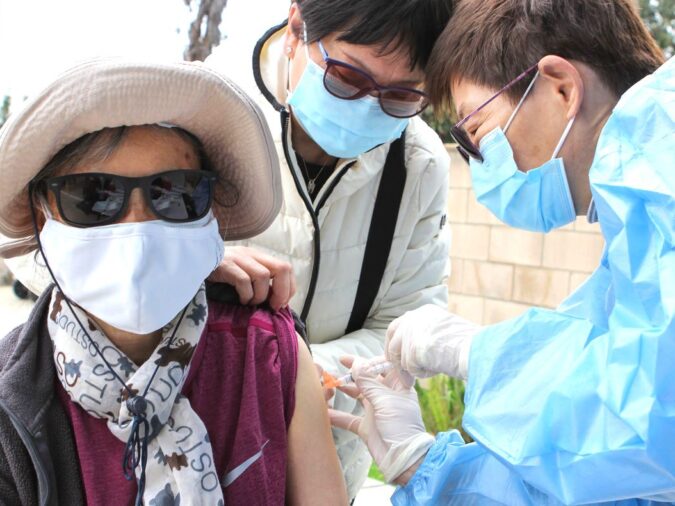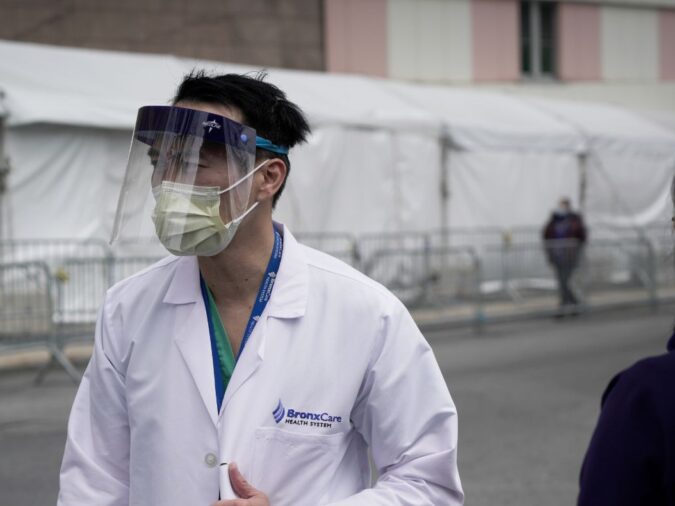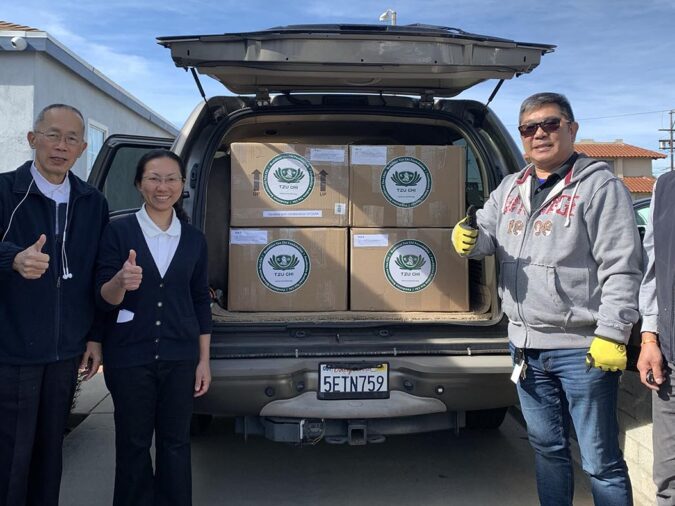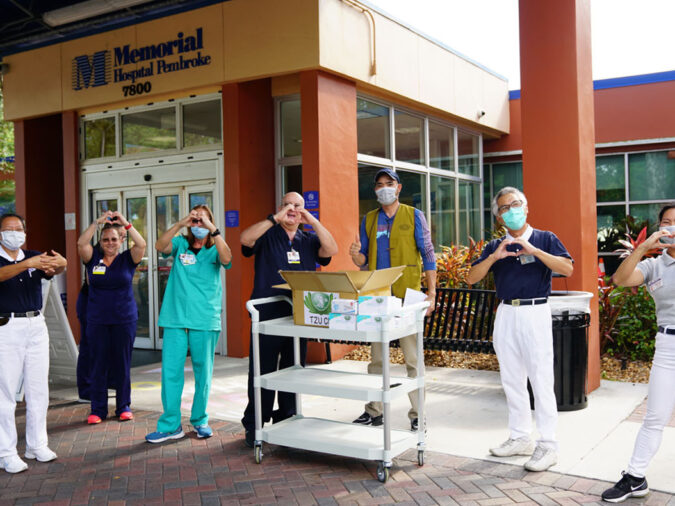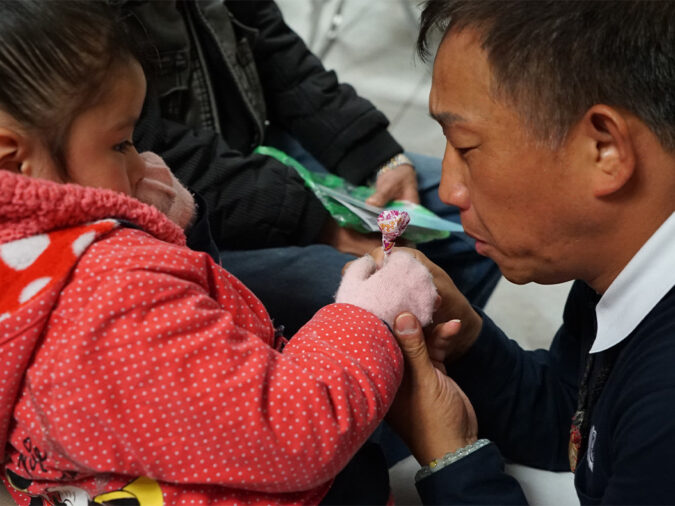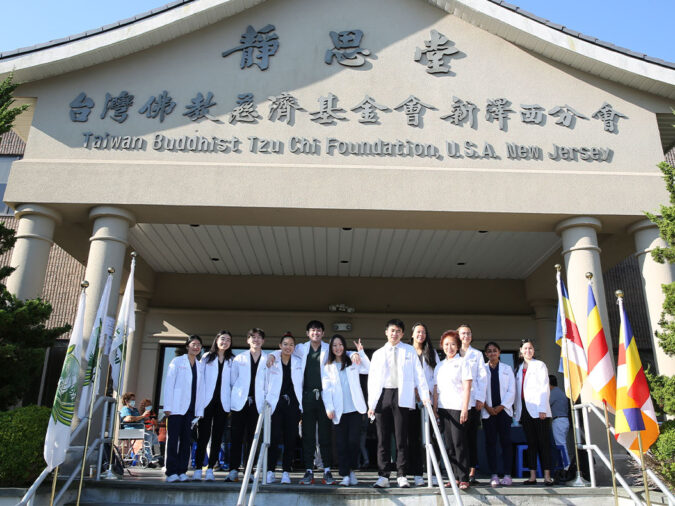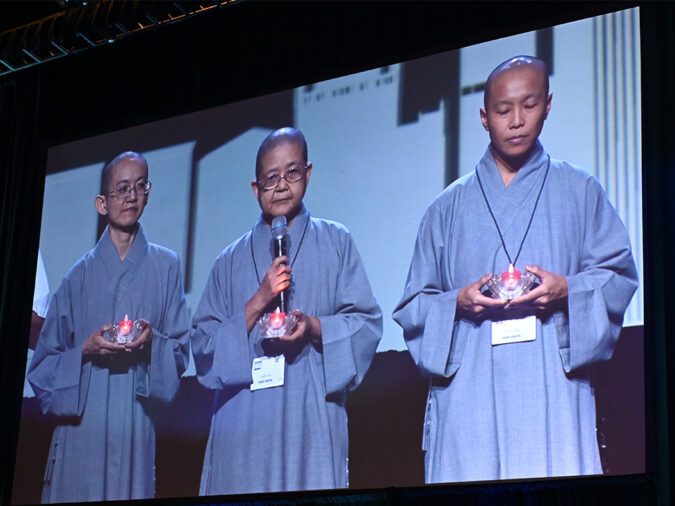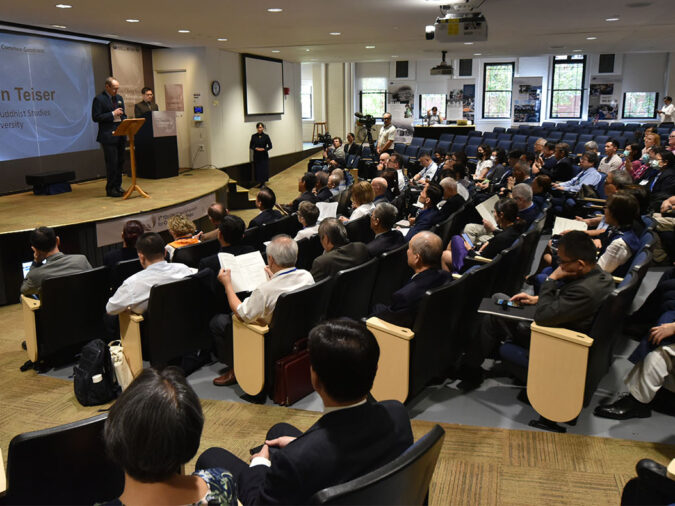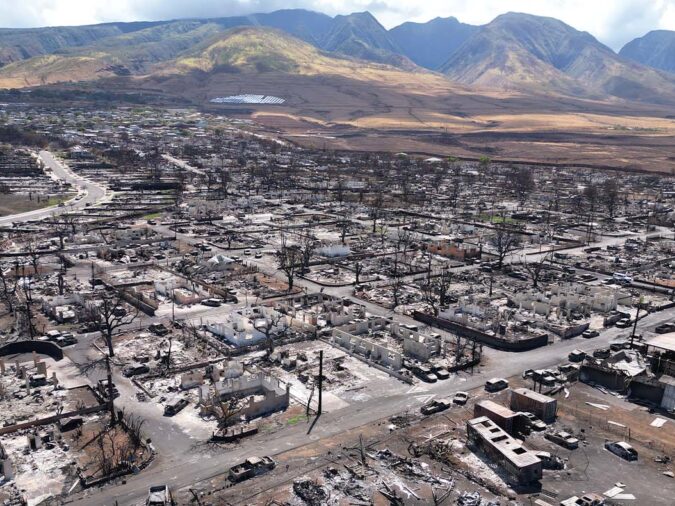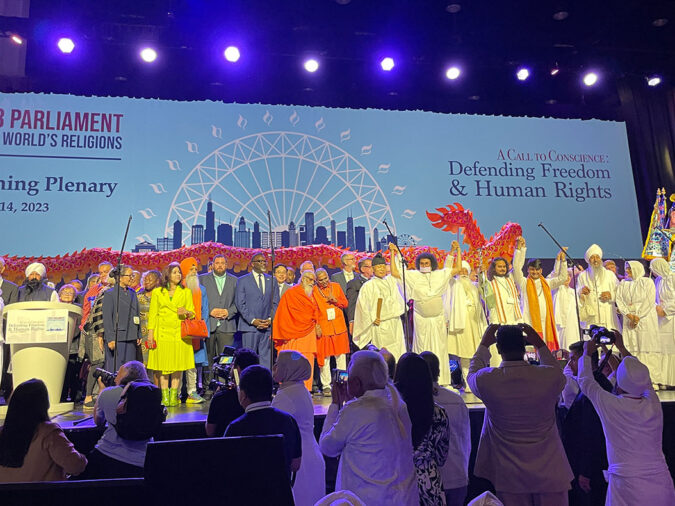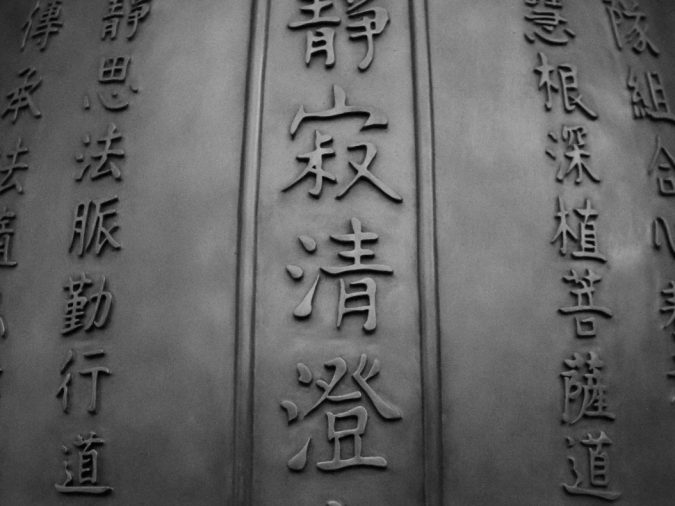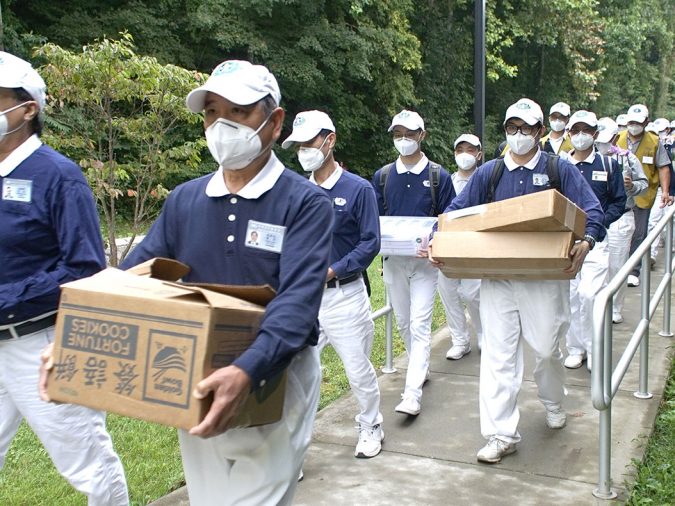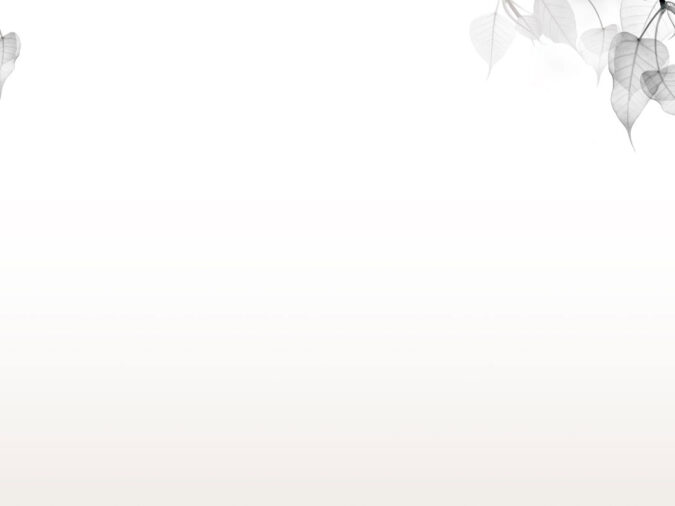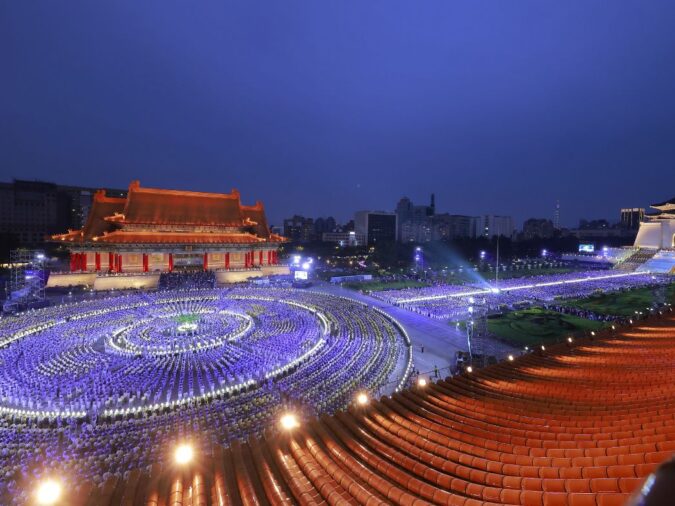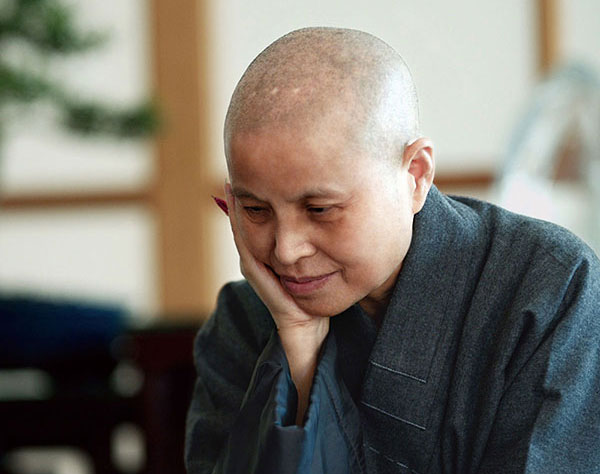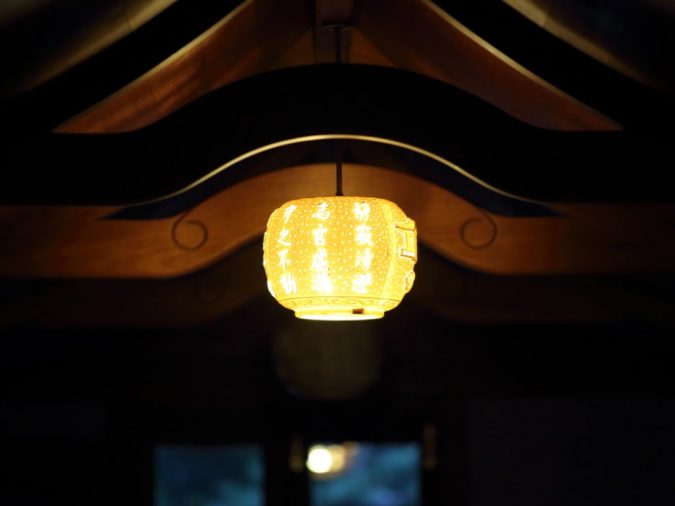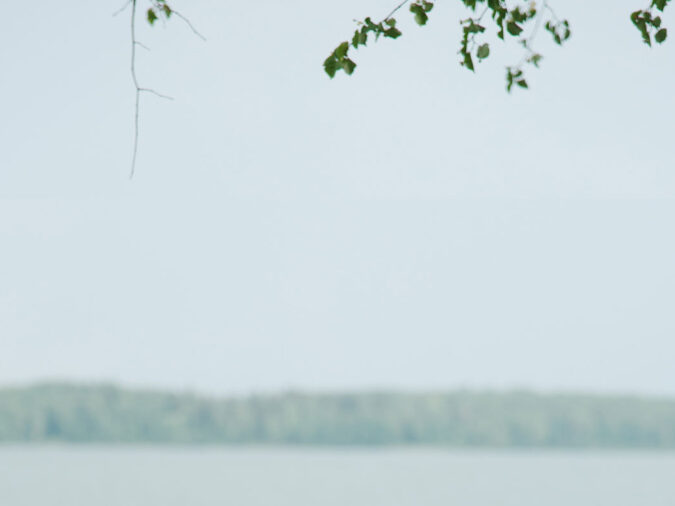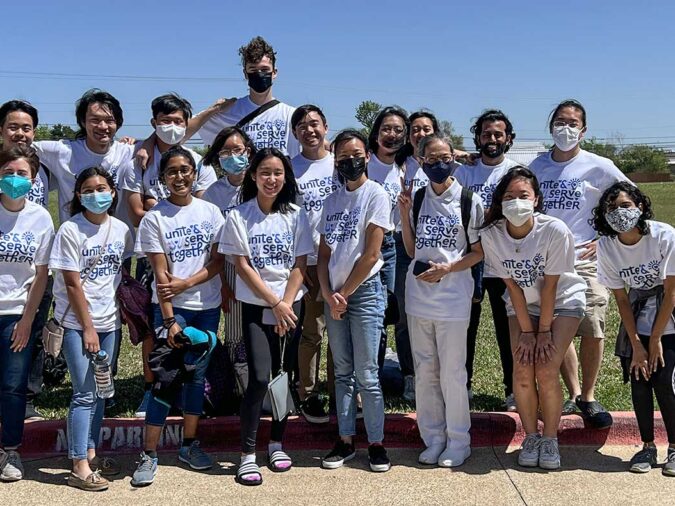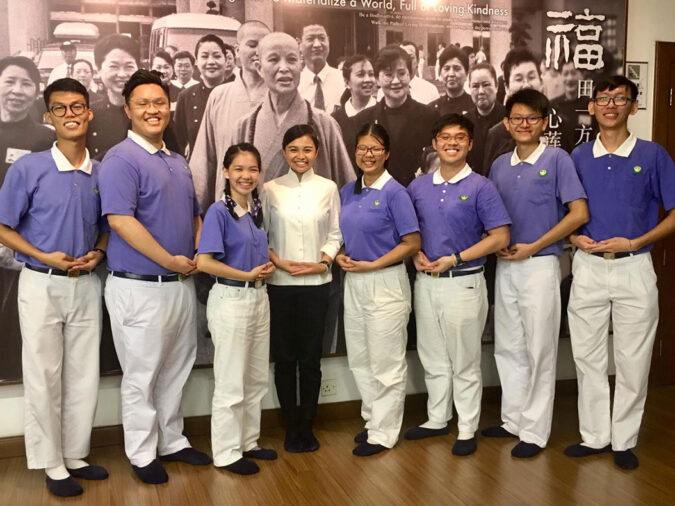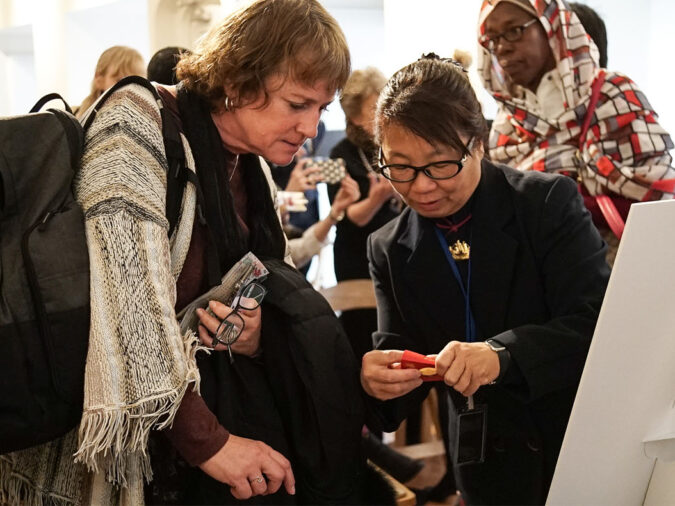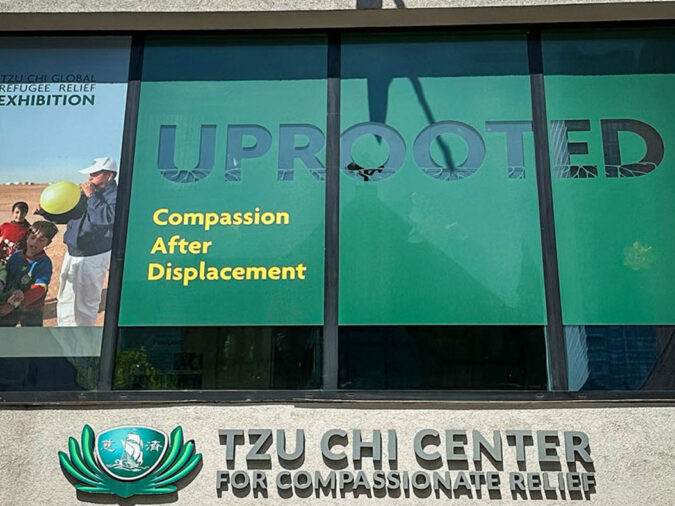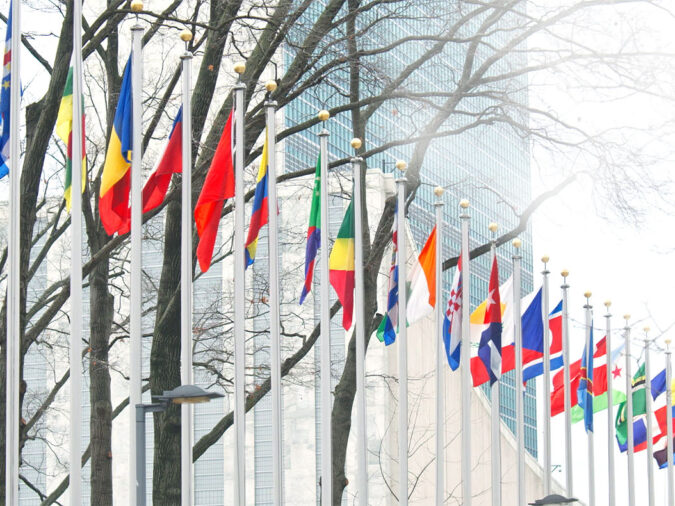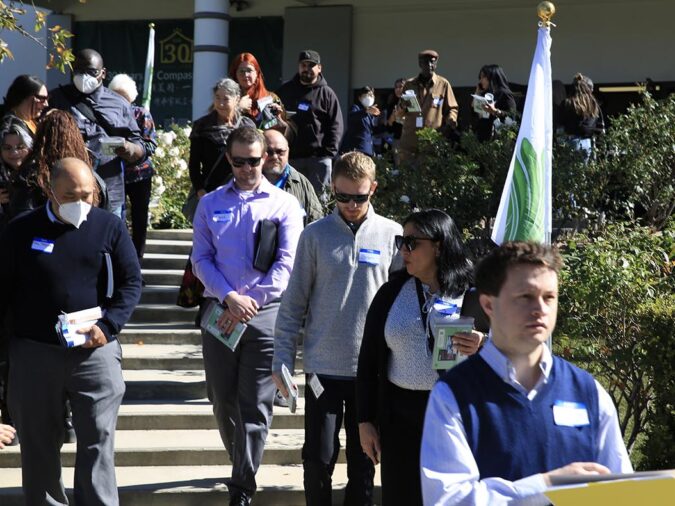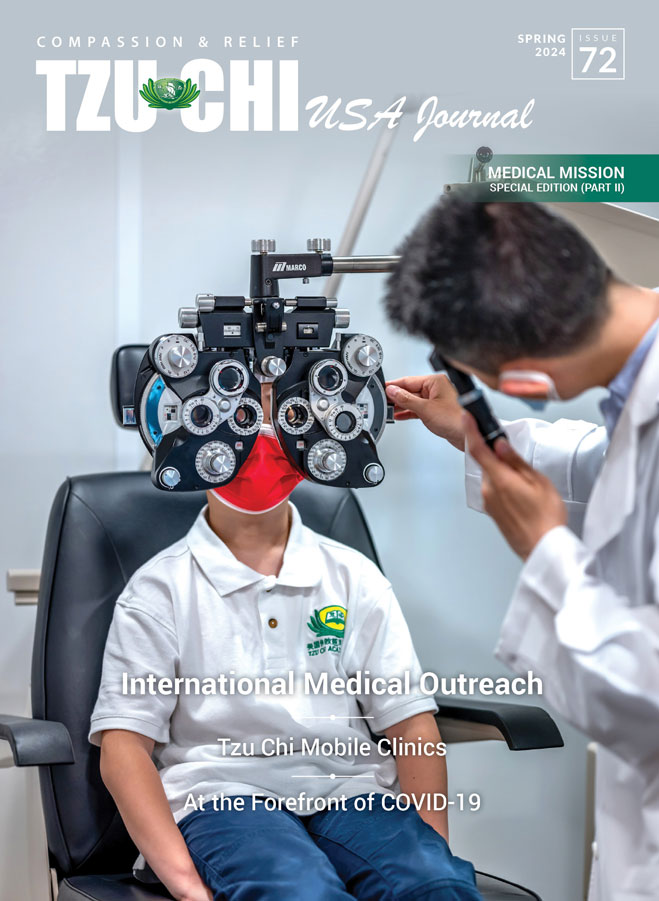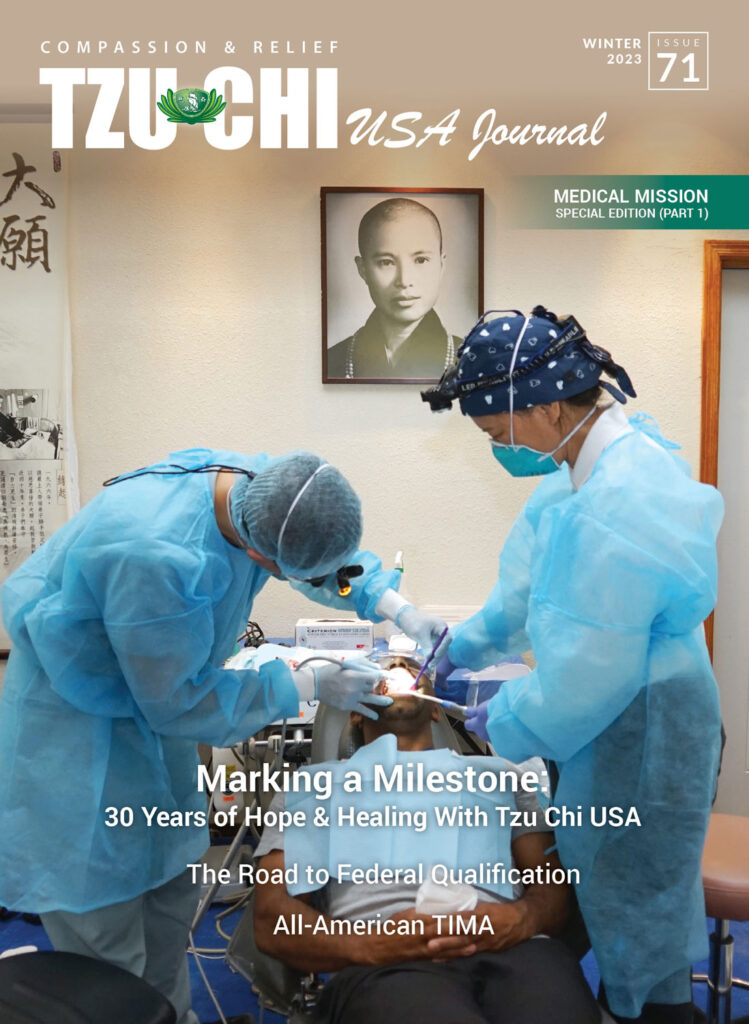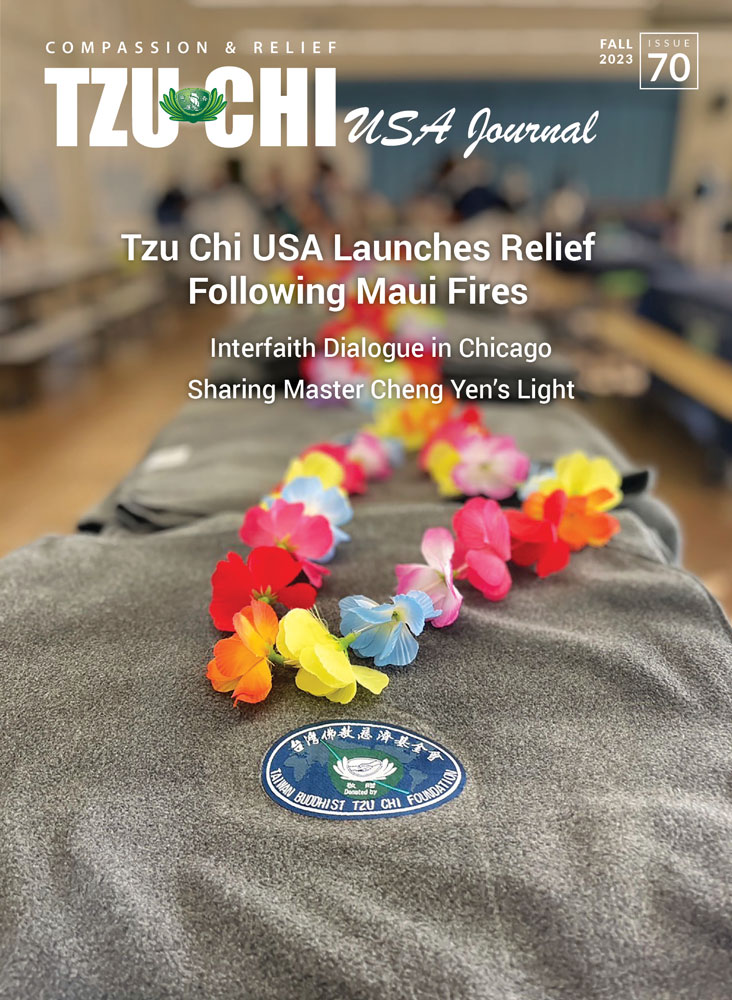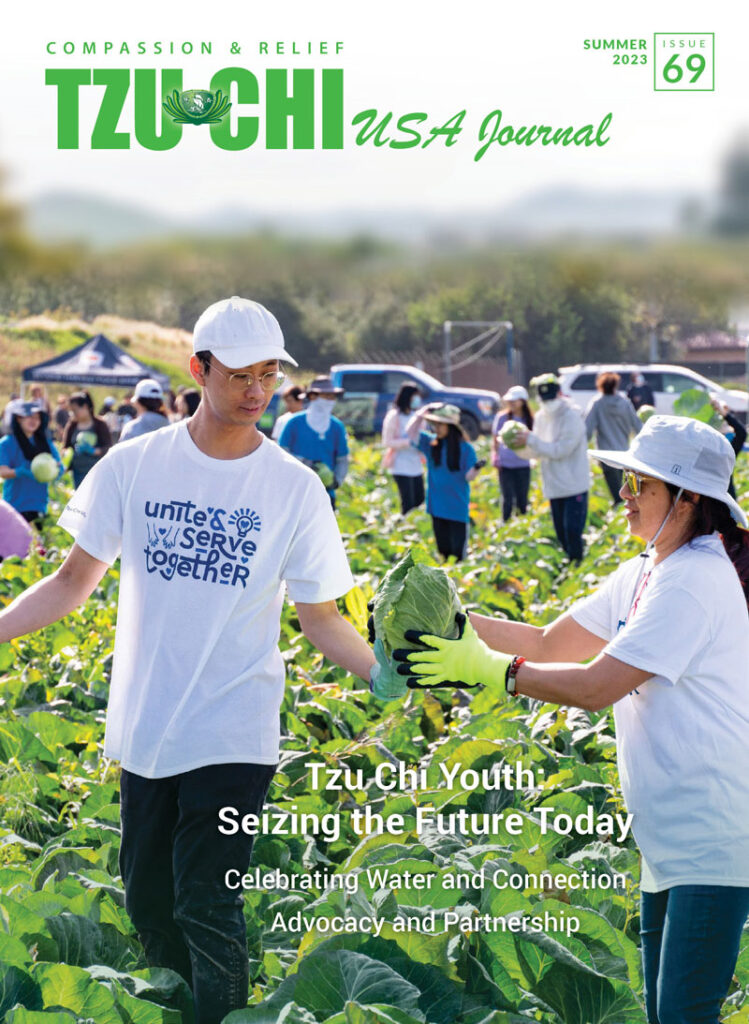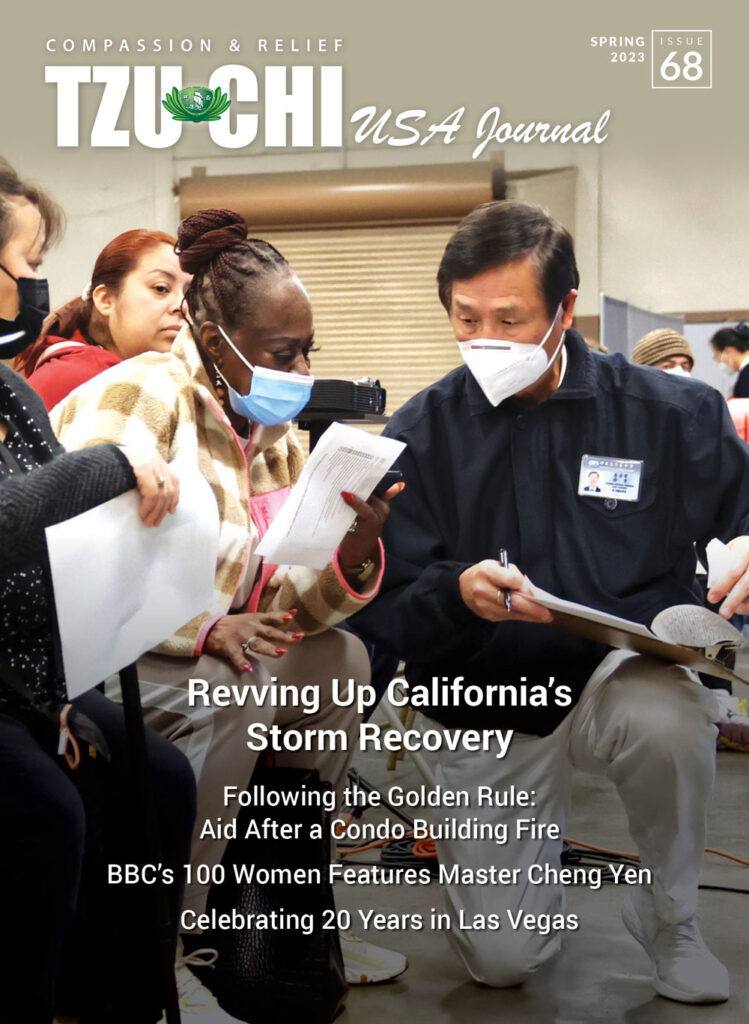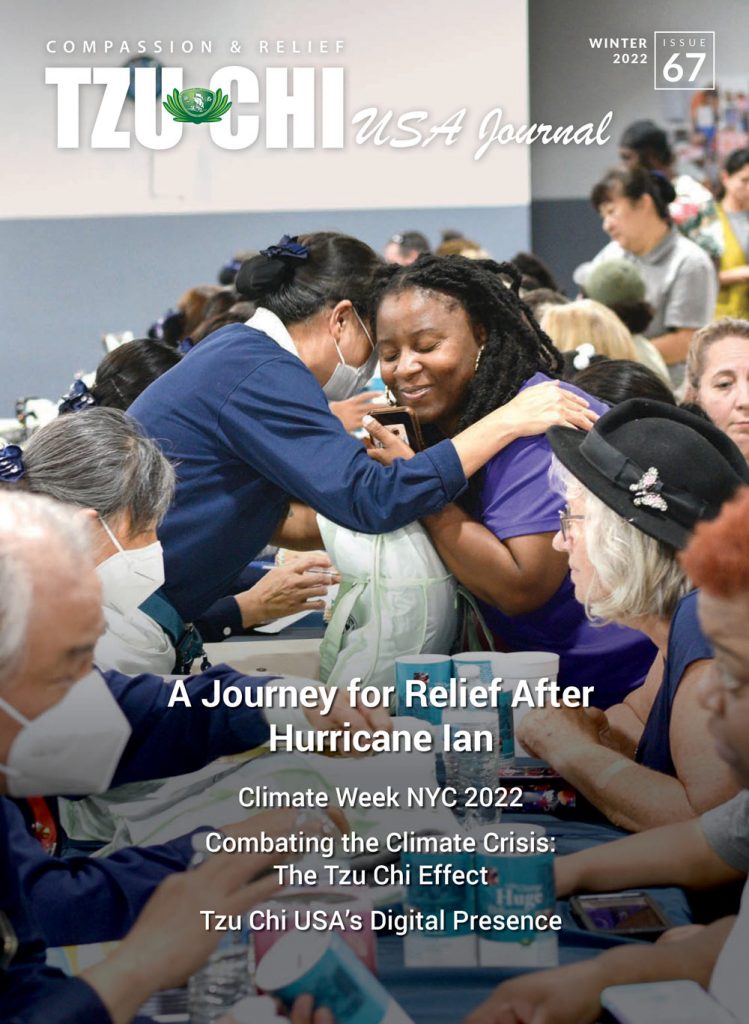CHAPTER 4
International Medical Outreach
Haiti
Written by Jiali Liu, Gina Shih, and Towen Tseng
Translated by H.B. Qin
Published #72 | Spring 2024 Issue
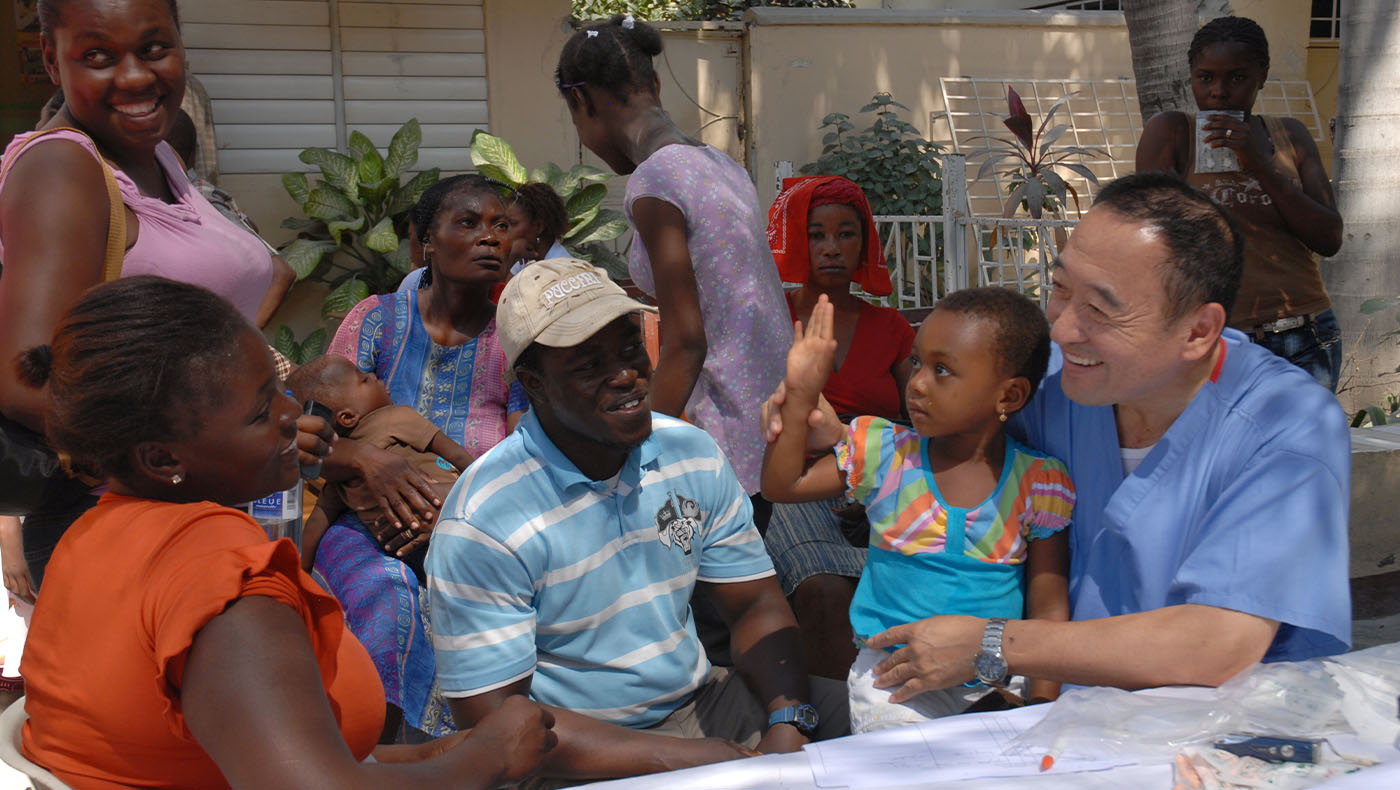
On February 9, 2010, Tzu Chi begins offering free clinic services in Croix-des-Missions, in Port-au-Prince, Haiti. Pictured are TIMA member Dr. Mathew Lin (right) and local community residents at the event. Photo/Chiali Tsai
SHARE
Located on the western three-eighths of the island of Hispaniola, Haiti is the third largest and most populous country in the Caribbean. The beauty of this nation is often overshadowed, however, by overwhelming gang violence that has created a humanitarian crisis, in addition to worsening socioeconomic conditions that have gripped the people of Haiti for years.
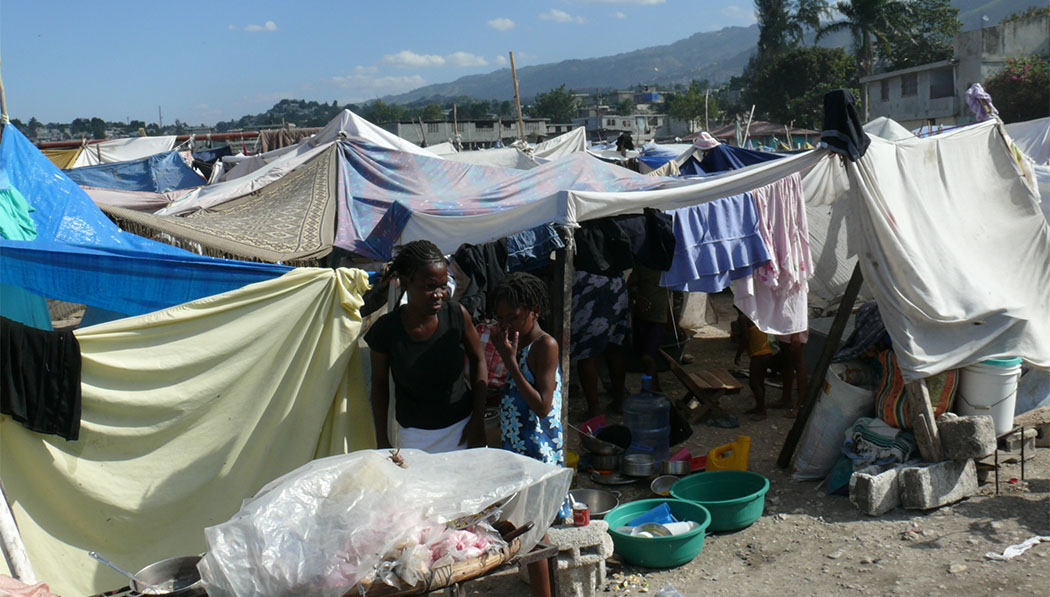
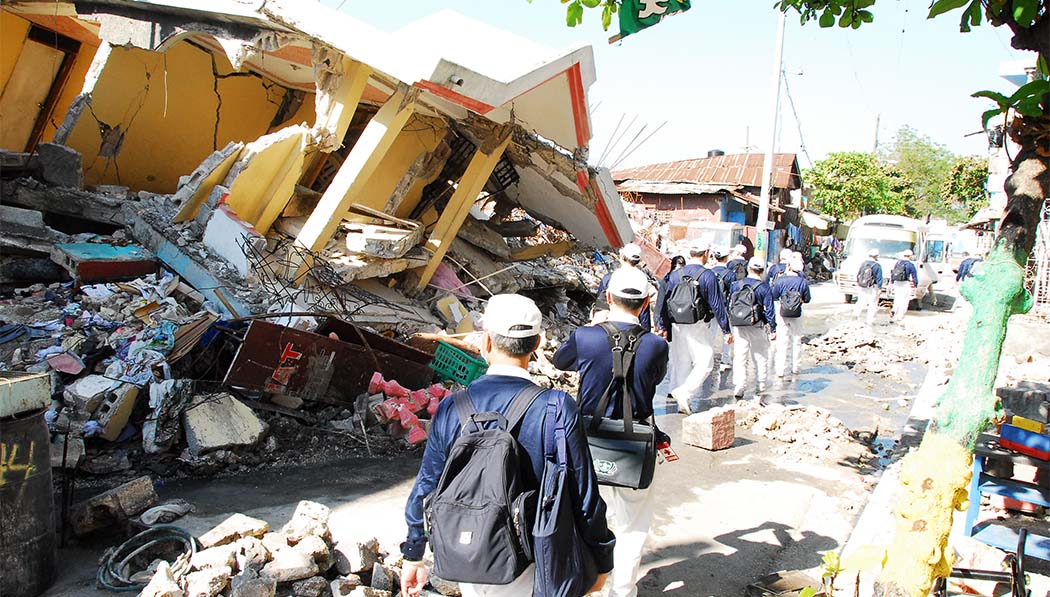
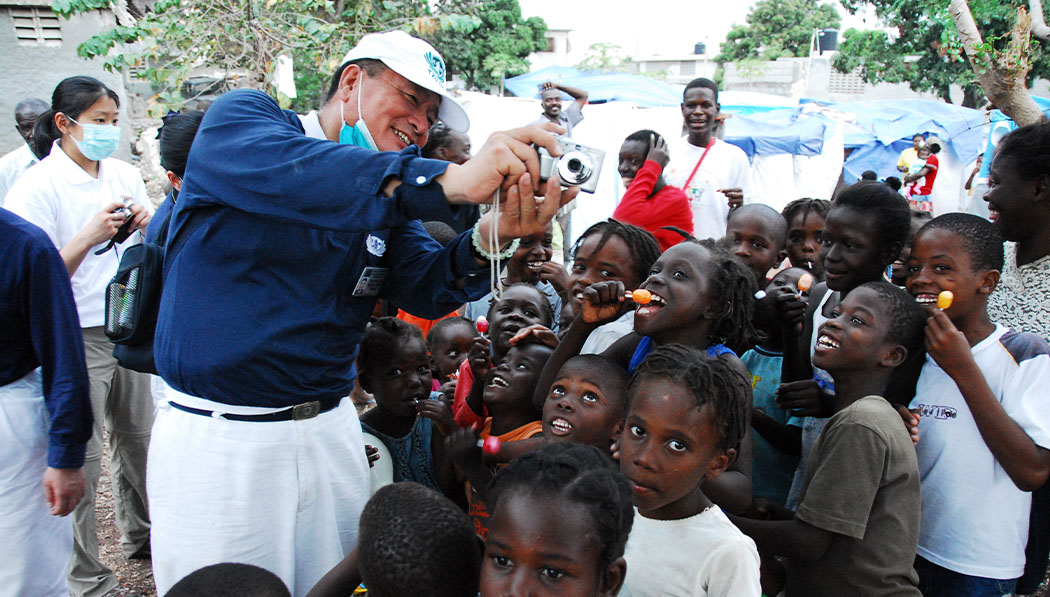
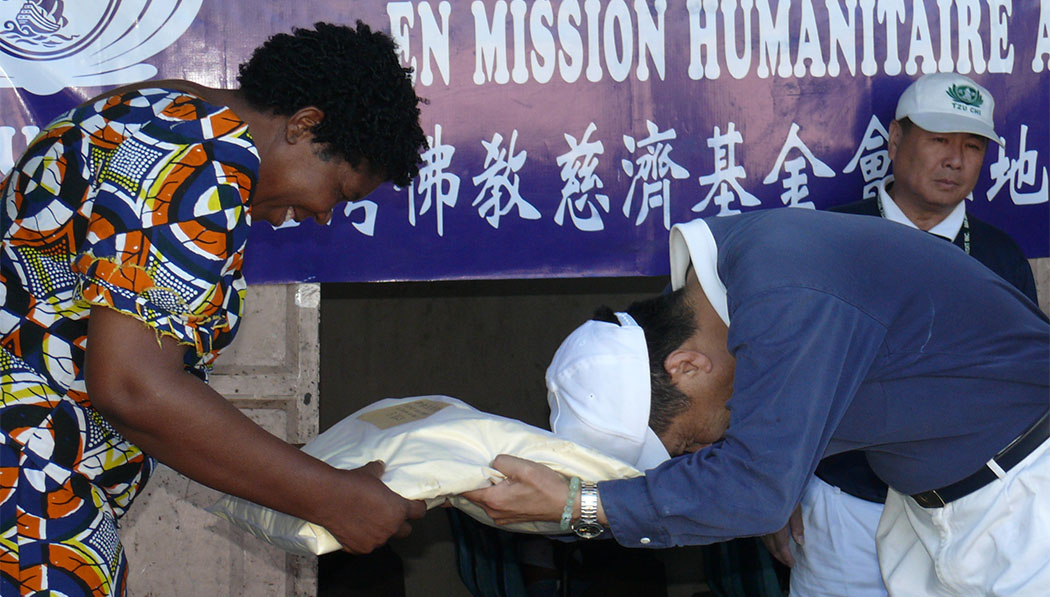
Launching a Mission for Medical Relief
On January 12, 2010, a powerful 7.0 magnitude earthquake struck Haiti, destroying roads and homes. With its epicenter near Léogâne, the earthquake’s destruction also impacted Port-au-Prince, Haiti’s capital, where landmark buildings such as the Presidential Palace were severely damaged. An estimated three million people were affected by this tragedy, with an estimated 250,000 residences and 30,000 commercial buildings having collapsed or incurred severe damages, ultimately contributing to an ongoing cholera epidemic.
Under the guidance of William Keh, the then-CEO of Tzu Chi USA, the relief team overcame challenges and entered the hard-hit area of Port-au-Prince on January 18. Here, the scenes before them shocked the volunteers to their core. Military helicopters circled in the air; soldiers patrolled with visible weapons; the smell of smoke, waste, and those who had passed away permeated the air. Shattered buildings blocked the streets, and survivors set up makeshift tents out of bed sheets to shelter their families. Volunteers from local charitable organizations cooked a pot of black beans sprinkled with green onion to fill the stomachs of 50 people.
Right now, everyone is sleeping on the streets; a lot of the residents in the epicenter have lost everything and have no shelter, so if we don’t help, what’s going to happen in a few months?
Nicole Muller
Local Volunteer
Tzu Chi mobilized immediately after hearing the news, preparing supplies, and launching a disaster assessment and relief program. The Tzu Chi USA National Headquarters team in Haiti and the Dominican Republic jointly set up a Disaster Relief Coordination Center and prepared 400,000 items of food, daily necessities, medical supplies, and other relief supplies. Tzu Chi started its first distribution in Haiti on January 29. Over the next 60 days, a total of 84 distributions were held. The supplies included 110 tons of instant cornstarch, 80 tons of instant rice, 6,000 tents, 40,000 tarpaulins, and more, benefiting nearly 200,000 survivors.
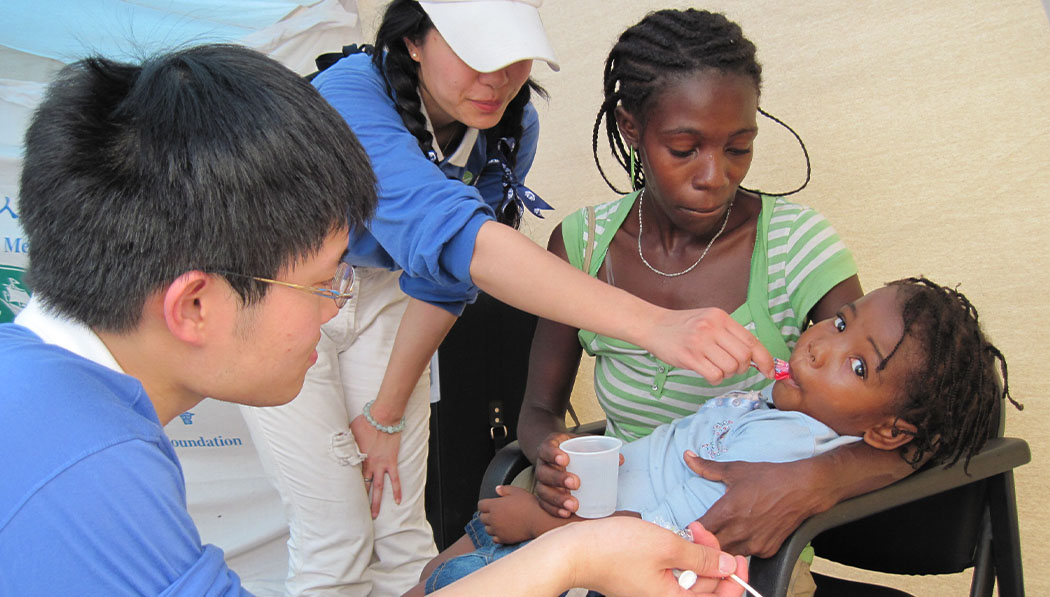
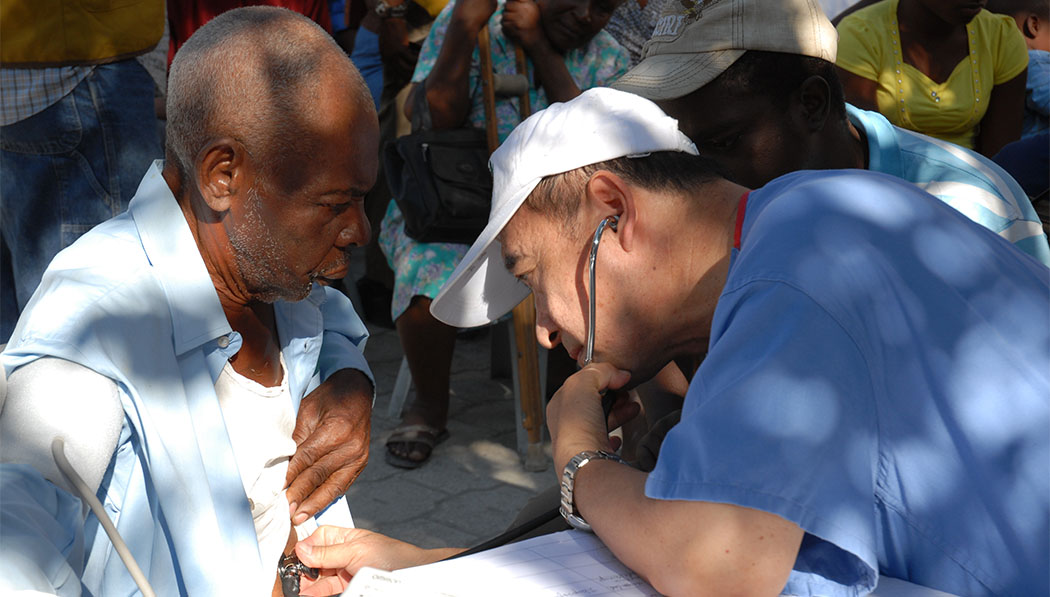
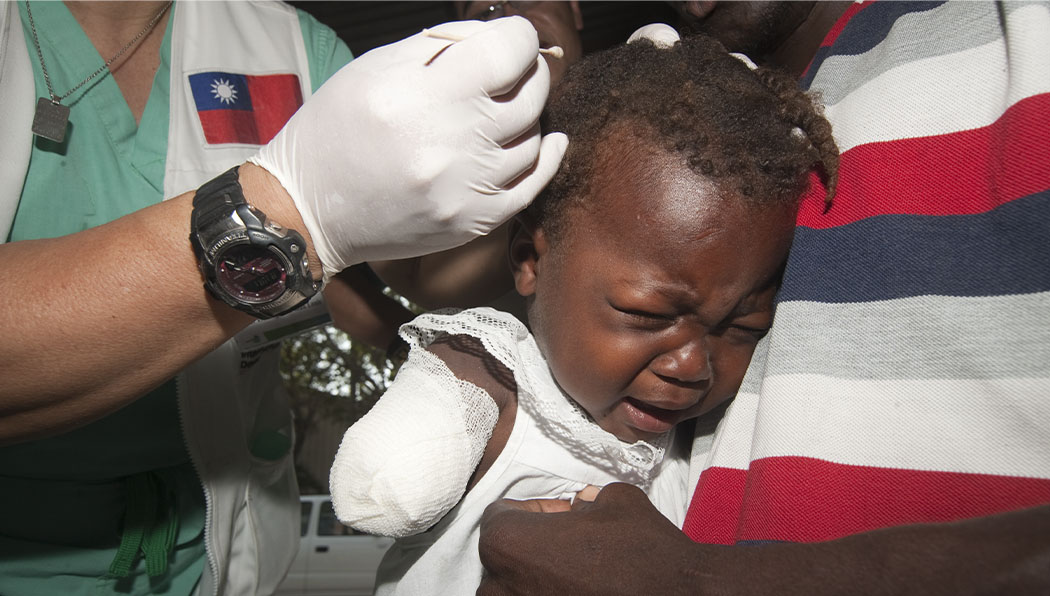
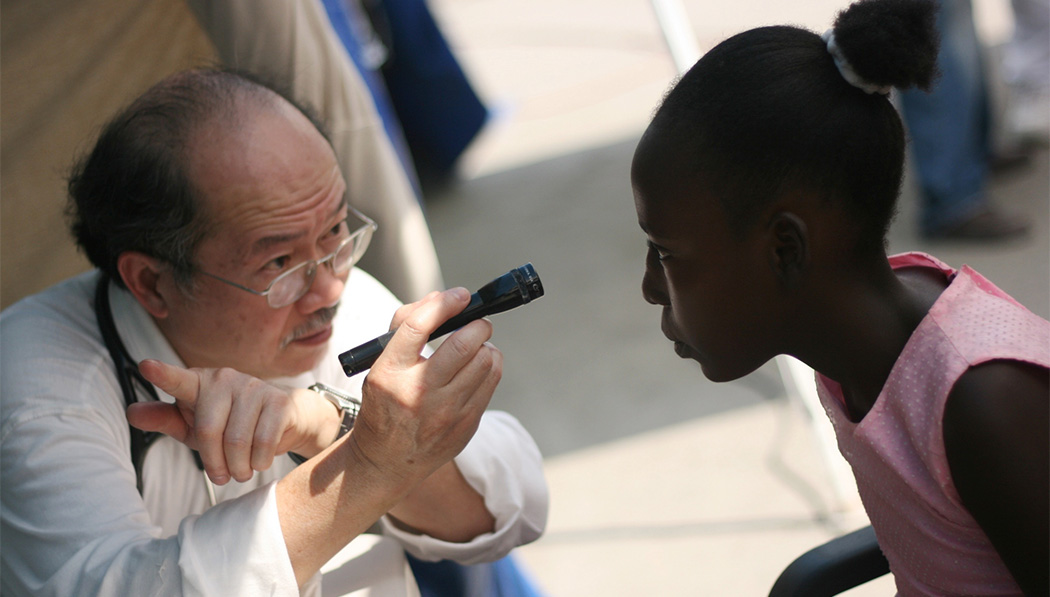
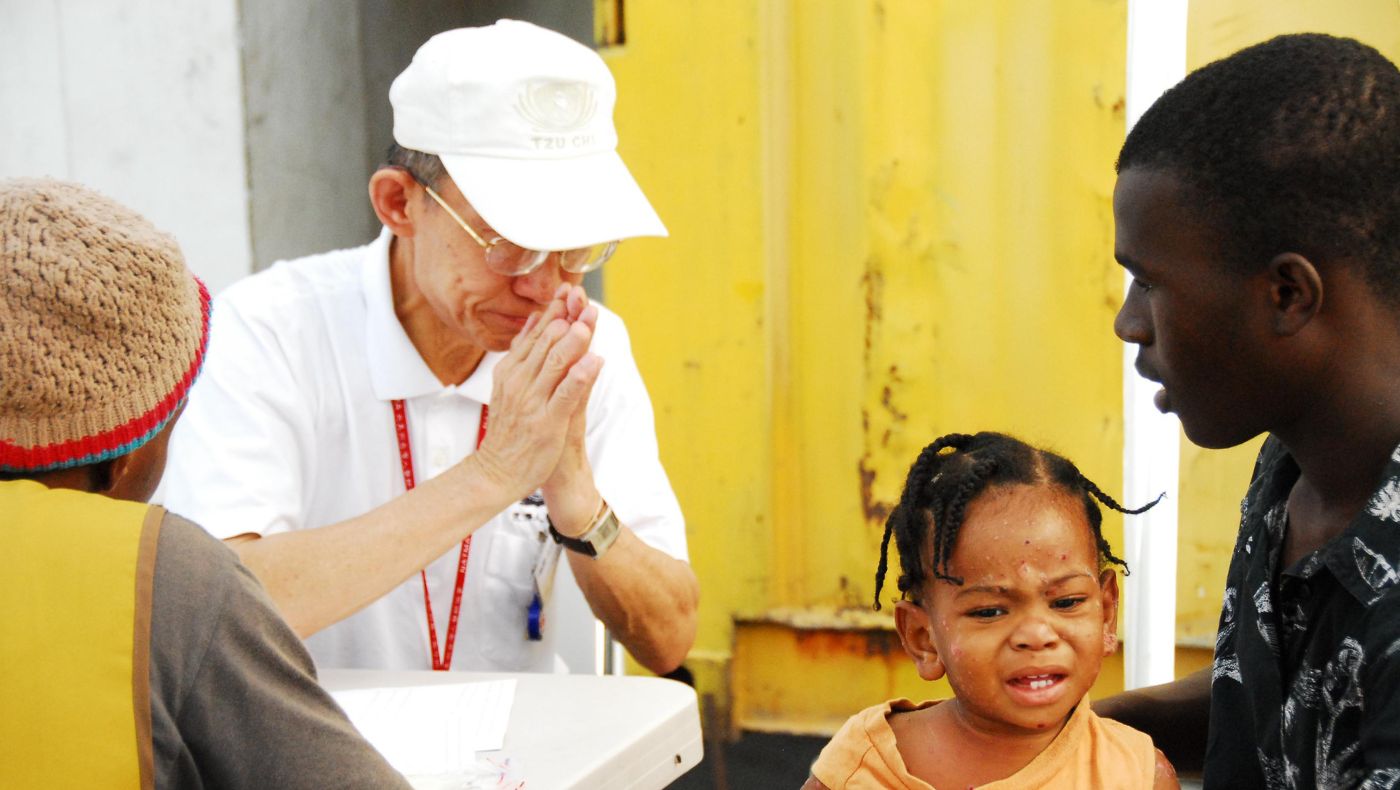
The Free Clinic That Lasted Eight Weeks
The continuous emergency relief that Tzu Chi provided to earthquake survivors offered a glimmer of hope amid such a stressful situation. However, millions of survivors injured in the earthquake were at risk of losing their lives due to the lack of medical resources and difficulties in accessing timely medical treatment.
When our medical team arrived there, we set up equipment. We witnessed the suffering of Haitians due to the disaster, and we also saw the destruction caused by the earthquake, which left a big impression on my mind.
Roger Tsai
TIMA Physical Therapist
The delivery of medical resources was imminent. Under the guidance of the current Tzu Chi USA CEO and previous Tzu Chi Medical Foundation CEO, Debra Boudreaux, Tzu Chi International Medical Association (TIMA) doctors signed up enthusiastically, quickly forming the Tzu Chi Haiti Disaster Relief Free Clinic Mission. The team organized a flight with the United Nations Humanitarian Air Service and flew from the Dominican Republic to Haiti on February 5. Regardless of the fatigue from the flight, the team had their first free clinic on February 6 at the United Nations field hospital. The free medical event treated 118 patients, and offered Western medicine, Traditional Chinese Medicine (TCM), and dentistry services.
The free clinic mission then expanded its footprint to more places to help meet medical care needs. On February 8, Tzu Chi held joint free medical outreach at the United Nations peacekeeping camp, St. Mary’s Church, and Overseas Engineering and Construction Company. On February 10, Tzu Chi joined hands with Médecins du Monde for a free dental clinic.
Medical professionals who went to Haiti shared many of the disaster survivors’ challenges that stemmed from resource scarcity. Many of what individuals might consider modern society’s conveniences were out of one’s grasp in the impacted area. Living in makeshift tents or other temporary housing made of tin, there was no place to sufficiently take cover if it rained or was windy. Securing personal privacy was likewise a concern; the makeshift toilets could only provide a basic covering, and clean water was precious to everyone.
In the medical treatment area, volunteers met women who had suffered miscarriages, children with persisting high fevers, and newborns who were grievously ill. In the face of an increasing number of patients and a shortage of resources, the free clinic mission sought to strengthen Tzu Chi’s medical relief efforts by focusing on trauma and pediatrics, bringing medicines for trauma to treat local survivors, and addressing a wide range of injuries and illnesses.
The U.N.’s medical service camp was like a large field hospital, with thousands of patients crowded into tents waiting to be seen by doctors. There was no such thing as infection control or privacy here, and the large tents filled with stretchers were where the pediatrics department saw children who were suffering from a wide range of infections and injuries.
Amy Huang
TIMA Physician
During the free clinic, the medical teams worked from morning until night to treat a wide range of ailments, with real-time consultation by local translators, and more than 200 patients were cared for every day. During the eight-week free medical outreach, TIMA doctors from 13 U.S. states, along with 73 doctors from Canada, the Dominican Republic, and Argentina, came in ten teams from February through April, providing care to 15,264 patients. At each visit, the doctors placed their hands together and bowed deeply to their patients, grateful to give relief.
Peter Chen and Shirley Chen, then vice presidents of the Medical Foundation, are surgeons and dentists, respectively. They led their teams in providing emergency medical care to the Haitian people, and offered on-site health education. To overcome barriers in language and literacy, the TIMA USA team designed visuals in the medication bag to indicate when each of the medications should be taken, with the rising sun indicating the morning, the full sun indicating high noon, the moon indicating night, and a bed indicating bedtime.
In the face of so much suffering around them – and support from across the globe – medical professional volunteers like Amy Huang always wished they could serve one more patient, communicate with one more volunteer, and take one more photo with those they had met. “Although I can’t describe it all, the free clinic trip to Haiti has cleansed my life,” said Huang. “When I go back to my normal life, I will definitely hold on to the great love that I have realized on this trip.”
A Solution to Persistent Pain
Tzu Chi’s free clinic mission at the disaster site was to provide Traditional Chinese Medicine (TCM) treatment; however, cultural and linguistic differences made TCM consultations more challenging than some other disciplines. A TCM doctor with TIMA shared notes that described some of these challenges so that other TCM doctors who provided care in the future could proceed smoothly. These included guidance for drawing blood and how language or cultural differences may impact how pain is described. For example: “Often, chest pain is described as a stomach ache, and patients with lower back pain often describe the condition as hip pain. Grasping these differences in descriptions, one knows they should not be taken lightly. A diagnosis should only be made after palpation.”
In the tumult of the disaster area, TIMA doctors and nurses frequently adjusted the temporary medical tents to ensure patients could feel as comfortable as possible. And indeed, many survivors left with bright smiles after receiving treatment.
One patient who left a lasting impression on Tzu Chi’s team was 39-year-old Clarelsom, who limped into the Tzu Chi free clinic area on crutches, seeking hope to return to everyday life.
Fourteen years of pain and tremors forced Clarelsom to give up his job as a trumpet player in a band, and he lost his ability to make a living. Unable to receive help locally, Claesson entrusted his hope for recovery to TIMA doctors.
As Claresom stepped into the exam area, he was shivering and sweating from the pain; his clothes were soaked from his exertions. Dr. Mike Liaw, a TCM physician from Northern California, performed the visual, auditory, and olfactory examination and consultation, followed by an acupuncture session. Claesson’s body calmed down soon after, and his pain eased.
Claesson visited Tzu Chi’s doctors for the following three days. After the treatment, he put down his crutches and tentatively stood up straight, walking gingerly at first, then tried trotting and hopping when he didn’t experience the pain he had become so accustomed to. Those who saw him and knew his situation cheered and applauded him. He was so delighted to be relieved of the pain he had suffered for so many years that he burst into tears, saying, “I really hope I can return to my normal life.” Dr. Liaw patted him on the back, trying to keep his own tears at bay.
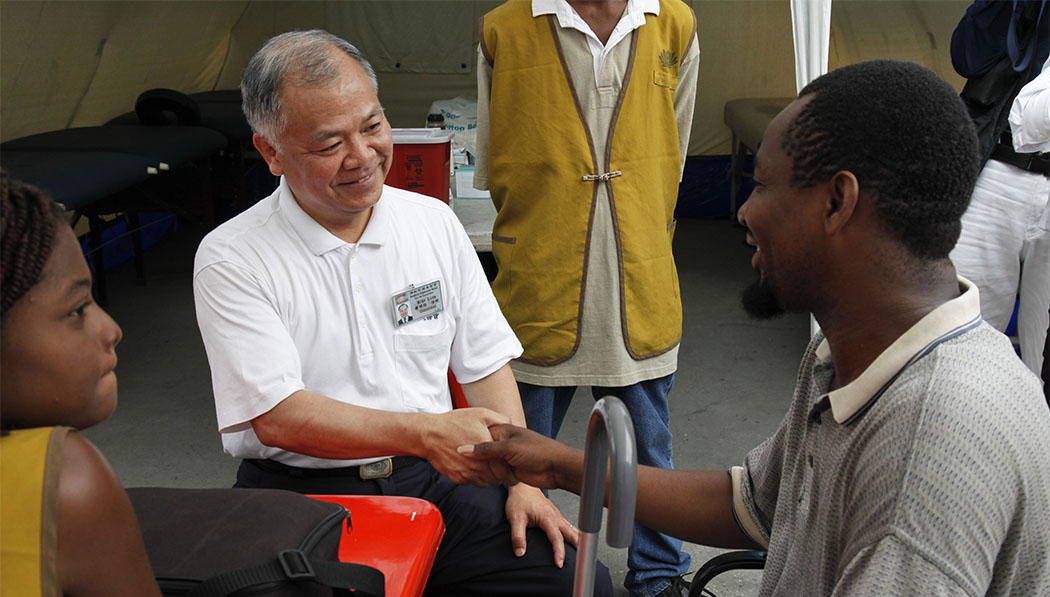
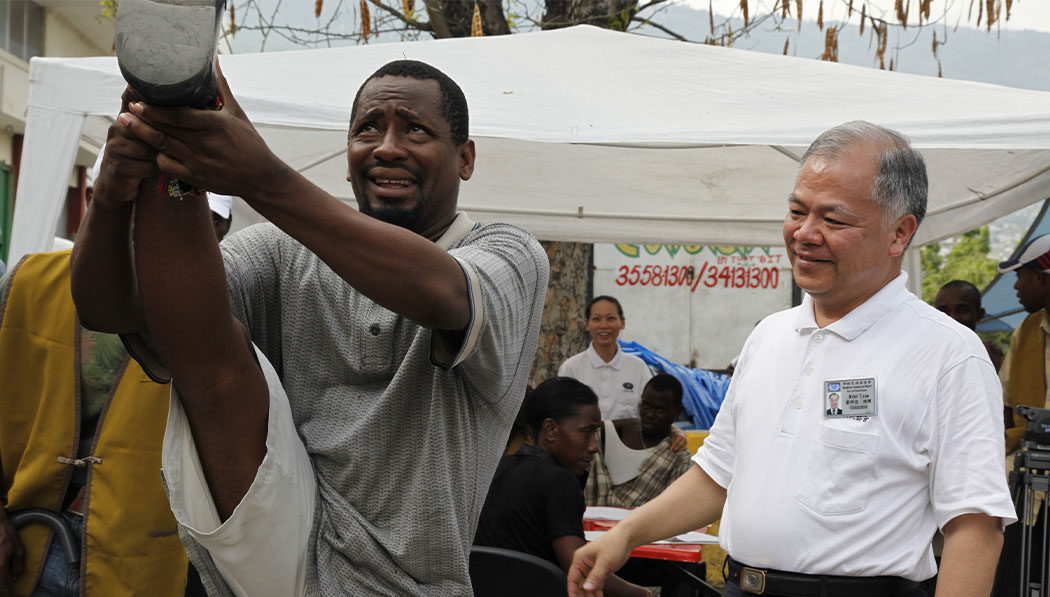
SHARE
If you have the opportunity to give, seize it in time. Although it is inevitably tiring when you do it, so long as you can grasp the moment and put your heart and soul into it, you can leave an everlasting impact.
Mike Liaw
TIMA Physician
TIMA’s TCM practitioners additionally provided treatments to serve frontline relief workers and peacekeeping teams so that they could continue to rescue and care for local survivors.
Standing on One’s Own
Robinson, a driver for the Tzu Chi relief team, tragically lost his wife in the earthquake. His father lived in the United States. After the disaster, he could have taken his children to the U.S. to take comfort with his family, but he didn’t desire sympathy or alms; he wanted to rebuild his life in the place where he lived with his beloved spouse.
Even though long-term upheavals are bound to foster cynicism, many Haitians still hope to regain their footing and earn food and clothing with their own hands.
Therefore, Tzu Chi’s Cash-For-Relief program helped the Haitian people stand independently in the aftermath of the disaster, creating jobs that enabled locals to earn the funds they desperately needed to care for their families. Volunteers held discussions with local community leaders and asked them to call upon more people, inspiring local community members to work together to clear streets and homes of rubble. Tzu Chi provided both food and wages, and lifted up optimism for the future.
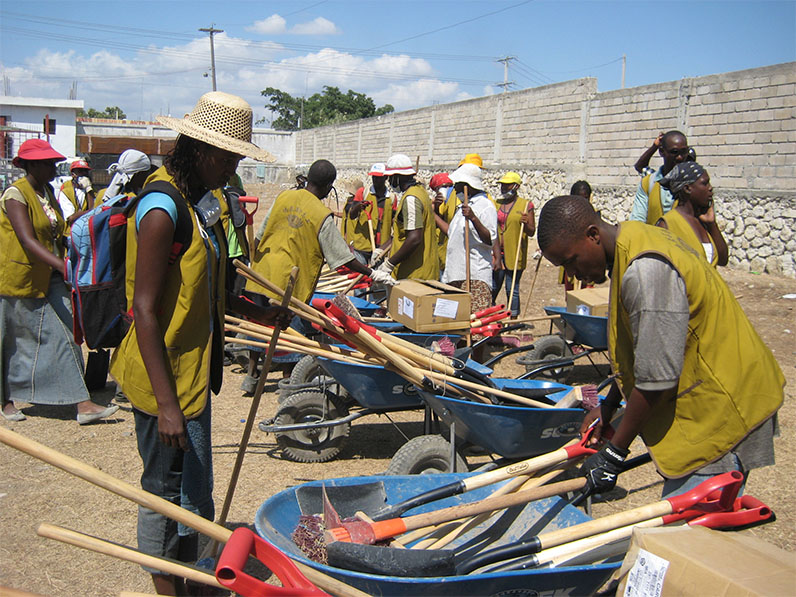
During the free clinic, TIMA also promoted the Cash-For-Relief program and recruited local doctors to join the free clinic. When Tzu Chi’s short-term relief operation ended, these local doctors continued to serve the people at Tzu Chi’s free clinic stations. A local medical team organized the first large-scale free medical event in Haiti in March 2013, providing medical services to 600 patients.
In November 2013, a team of 33 local medical professionals and volunteers provided free medical services to 120 students and their parents at the Roussan Camille School in Port-au-Prince, Haiti, offering Western medicine, dentistry, and psychological counseling. After the free clinic, the medical team found that many patients with serious conditions needed long-term medical assistance. The team subsequently visited the patients’ homes several times from February to March 2014, doing their best to help them regain their health. Since then, Tzu Chi volunteers from the U.S. and Haiti, as well as medical professionals from Port-au-Prince, worked together to hold multiple free clinics until the fall of 2017.
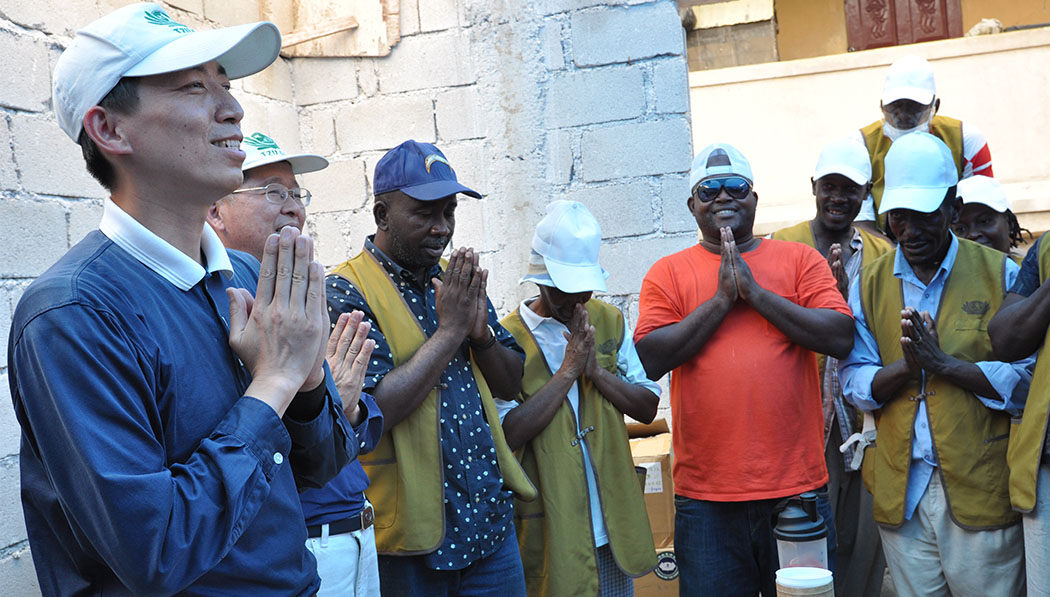
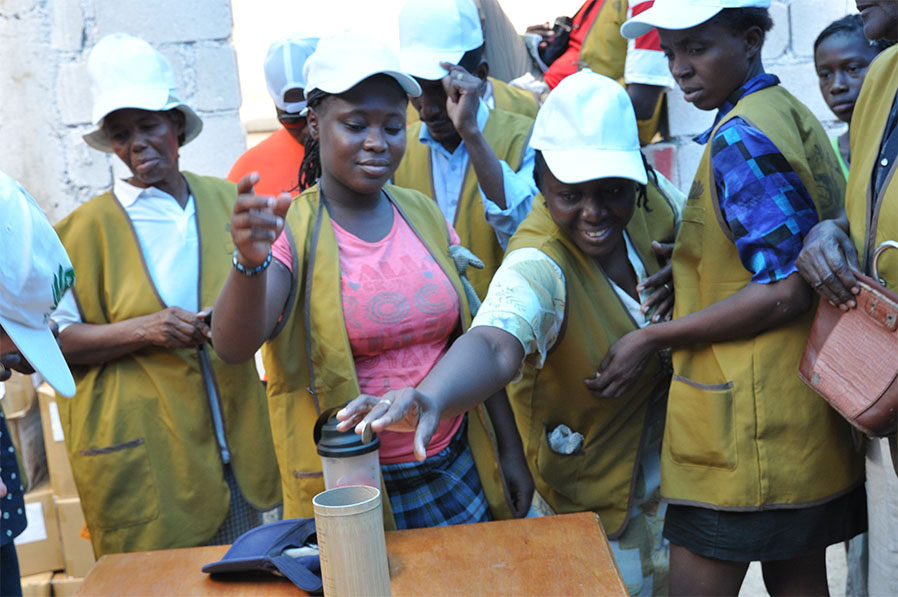
SHARE
Due to the disruption of social security by local gangs, subsequent medical free clinic services could not be organized out of consideration for the safety of the Tzu Chi medical volunteers. Still, the international disaster relief and free clinic mission touched many locals, who set their hearts on becoming volunteers to pass their love forward. Not only was a Tzu Chi chapter established in Haiti later on, but volunteers also held recurring rice distributions and organized women’s vocational training in disadvantaged areas, activities that continue to this day. In 2021, when a major earthquake occurred in western Haiti, Tzu Chi’s relief supplies and family medical kits were delivered to those in need at the disaster’s epicenter, and hot food distributions were carried out through local Tzu Chi volunteers in Haiti.
Stayde, a university student who served as a translator during Tzu Chi’s 2010 free medical outreach, witnessed the pain and suffering, realized his own life’s blessings, and thus shared his thoughts. “I have a healthy body and mind; I must do more for the traumatized people,” he told volunteers. “In this way, the spirit of Tzu Chi has spread from one living soul to another, taking root and growing in this land.”
SHARE:
